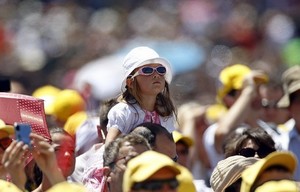Here's the Pope's Angelus address from earlier today. Notice the key points.
 Today in Italy and other countries Corpus Domini is
celebrated, the feast of the Eucharist, the Sacrament of the Body and Blood of
the Lord, which he instituted with the Last Supper and which is the Church's
most precious treasure. The Eucharist is like the beating heart that gives life
to the whole mystical body of the Church: a social organism entirely founded on
the spiritual but concrete link with Christ. As the Apostle Paul states: "Because
there is one bread, we, although many, are one body: all of us in fact
participate in the one bread" (1 Corinthians 10:17).
Today in Italy and other countries Corpus Domini is
celebrated, the feast of the Eucharist, the Sacrament of the Body and Blood of
the Lord, which he instituted with the Last Supper and which is the Church's
most precious treasure. The Eucharist is like the beating heart that gives life
to the whole mystical body of the Church: a social organism entirely founded on
the spiritual but concrete link with Christ. As the Apostle Paul states: "Because
there is one bread, we, although many, are one body: all of us in fact
participate in the one bread" (1 Corinthians 10:17).Without the Eucharist the
Church simply would not exist. It is the Eucharist in fact that makes a human
community a mystery of communion, able to bring God to the world and the world
to God. The Holy Spirit, which transforms the bread and wine into the Body and
Blood of Christ, also transforms into members of the Body of Christ those who
receive it with faith, so that the Church is truly the sacrament of the unity
of men with God and of men with each other.
In a culture that is ever more
individualistic -- like that in which Western societies are immersed and which
is spreading throughout the world -- the Eucharist constitutes a kind of "antidote,"
which operates in the minds and hearts of believers and continually sows in them
the logic of communion, of service, of sharing, in a word, the logic of the
Gospel. The first Christians, in Jerusalem, were an evident sign of this new
way of life because they lived in fraternity and held all of their goods in
common so that no one should be indigent (cf. Acts 2:42-47). Where did all of
this come from? From the Eucharist, that is, the risen Christ, really present
with his disciples and working with the power of the Holy Spirit. And in the
succeeding generations, through the centuries, the Church, despite human limits
and errors, continued to be a force for communion in the world. We think
especially of the most difficult periods, the periods of trial: What did it
mean, for example, for countries that were under the heal of totalitarian regimes
to have the possibility to gather for Sunday Mass! As the ancient martyrs of
Abitene proclaimed: "Sine Dominico non possumus" - without the "Dominicum," that is, the Sunday Eucharist, we cannot live. But the
void produced by false freedom can be dangerous, and so communion with the Body
of Christ is a medicine of the intellect and will to rediscover taste for the
truth and the common good.
Dear friends, let us call upon the Virgin Mary, whom
my predecessor, Blessed John Paul II defined as a "Eucharistic woman"
(Ecclesia de Eucharistia, 53-58). In her school our life too becomes fully "Eucharistic,"
open to God and to others, able to transform evil into good by the power of
love, which fosters unity, communion, fraternity.


Leave a comment